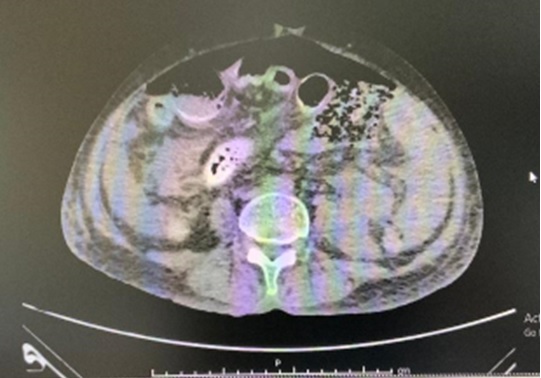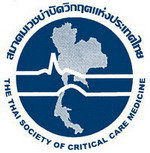Spontaneous intestinal perforation in critical COVID: A case report
DOI:
https://doi.org/10.54205/ccc.v30.256874Keywords:
COVID-19 peritonitis, Spontaneous small bowel perforation, Acute abdomen, Left atrial thrombosisAbstract
Spontaneous intestinal perforation is a rare extrapulmonary manifestations of critical COVID-19 case. The pathogenesis of viral etiology is still unclear and association to some essential therapeutic treatment such as steroid or interleukin-9 antagonist is also inconclusive. Surgery is not mandatory If source control and sepsis can be accomplished with available interventions reported in current literatures. This uncommon complication develops either at time of presentation or after hospital admission, both upper and lower gastrointestinal tract1 We reported an ARDS patient experienced cardiac thrombus without valvular defect or arrhythmia who was diagnosed of spontaneous intestinal perforation from acute necrotizing ileitis necessitated damage control surgery.
Downloads
References
Centers for Disease Control and Prevention. COVID-19. Available at. https://www.cdc.gov/coronavirus/2019-ncov/index.html. Accessed August 21, 2021.
Long B, Carius BM, Chavez S, Liang SY,Brady WJ, Koyfman A, et al. Clinical update on COVID-19 for the emergency clinician: Presentation and evaluation. Am J Emerg Med. 2022; 54:46-57.
Henry BM, de Oliveira MHS, Benoit J, et al. Gastrointestinal symptoms associated with severity of coronavirus disease 2019 (COVID-19): a pooled analysis. Intern Emerg Med. 2020; 15(5): 857–859.
Gu J, Han B, Wang J. COVID19: Gastrointestinal manifestations and potential fecal–oral transmission. Gastroenterology. 2020;158(6):1518-19.
Jin X, Lian JS, Hu JH, et al. Epidemiological, clinical and virological characteristics of 74 cases of coronavirus infected disease 2019 (COVID-19) with gastrointestinal symptoms. Gut. 2020;69(6):1002-9
Hoffmann M, Kleine-Weber H. Schroeder S, et al. SARS-CoV-2 Cell Entry Depends on ACE2 and TMPRSS2 and Is Blocked by a Clinically Proven Protease Inhibitor. Cell. 2020, 181, 271–280.e8.
Trevelin SC, Pickering S, Todd Katrina, et al. Disrupted Peyer’s Patch Microanatomy in COVID-19 Including Germinal Centre Atrophy Independent of Local Virus. Immunol. 2022. Feb vol (13). | https://doi.org/10.3389/fimmu.2022.838328
Yavuz H, Arslan A. Henoch-Schönlein purpura related intestinal perforation: A steroid complication? Pediatr Int. 2001;43(4):423-25
Group RC. Tocilizumab in patients admitted to hospital with COVID-19 (RECOVERY): a randomized, controlled, open-label, platform trial. Lancet. 2021;397(10285)
Gonzálvez Guardiola P, Díez Ares JÁ , Peris Tomás N, et al. Intestinal perforation in patient with COVID-19 infection treated with tocilizumab and corticosteroids. Report of a clinical case. Cir Esp. 2020;99:156–7.
Gout T, Ostör AJK, Nisar MK. Lower gastrointestinal perforation in rheumatoid arthritis patients treated with conventional DMARDs or tocilizumab: a systematic literature review. Clin Rheumatol. 2011; 30(11): 1471–1474.
Giuffre M, Di Bella S, Sambataro G, et al. COVID-19 induced thrombosis in patients without gastrointestinal symptoms and elevated fecal calprotectin: hypothesis regarding mechanism of intestinal damage associated with COVID-19. Trop Med Infect Dis. 2020;5(3).
Nahas SC, Meira JJD, Sobrado LF, et al. Intestinal perforation caused by Covid-19. Arq Bras Cir Dig. 2020;33(2):e1515.
Verma D, Sharma S, Kishore Garg L, Tinaikar A. Gastrointestinal perforation in COVID-19 patients - case series and review of the literature. Clin Surg Res Commun. 2020;4(4):13–7.

Downloads
Published
How to Cite
Issue
Section
License
Copyright (c) 2022 The Thai Society of Critical Care Medicine

This work is licensed under a Creative Commons Attribution-NonCommercial 4.0 International License.




